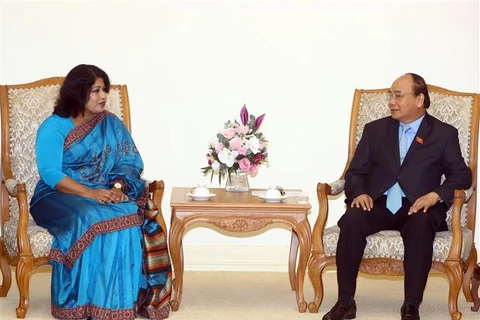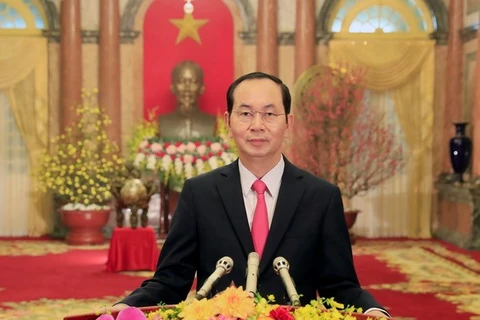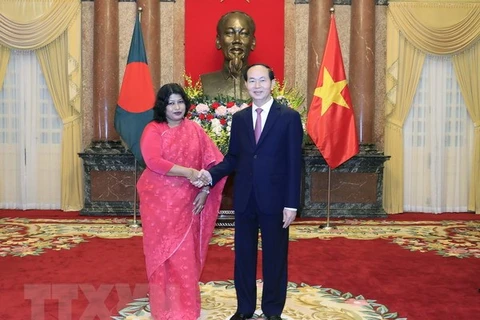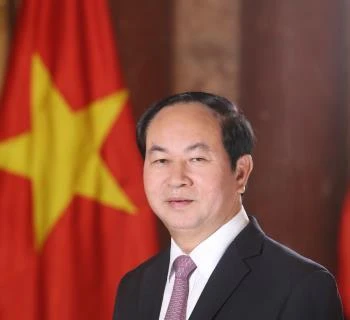Hanoi (VNA) – Vietnam wants to promote its investment in Bangladesh, especially in the fields of telecommunications, information technology, agriculture, food processing, garment, oil and gas, consumer goods production, infrastructure development and services, said President Tran Dai Quang.
President Quang made the statement in an interview granted to the Bangladeshi press on the occasion of his State visit to Bangladesh from March 4-6 at the invitation of President Mohammad Abdul Hamid. The following is the full text of the interview.
Q: Mr President, what is your evaluation of Vietnam-Bangladesh relations?
President Tran Dai Quang: Vietnam and Bangladesh have a fine traditional relationship based on historical similarities and values that the two nations have shared in terms of independence, peace, cooperation and development. In history, our countries have always showed mutual solidarity and support. Vietnam was one of the first nations to recognise the People’s Republic of Bangladesh’s independence in 1971. Bangladesh was also one of the first countries in Asia to recognise and establish diplomatic relations with the Provisional Revolutionary Government of the Republic of South Vietnam right after the Paris Agreement was signed.
Since the establishment of diplomatic ties 45 years ago, leaders and people of the two nations have treasured and preserved this valuable tradition, and at the same time, spared no effort to further enhance the development of bilateral relations. Senior leaders of Vietnam and Bangladesh paid mutual visits and regularly met at multilateral forums. Vietnam welcomed the visits by Bangladeshi Prime Minister Seikh Hasina in 2012, President Abdul Hamid in 2015 and Speaker of the Parliament Shirin Sharmin Chaudhury in 2017.
Bilateral cooperative relations in economy, trade, defence, security, agriculture, and education-training have witnessed encouraging development in recent years. In particular, two-way trade exceeded 900 million USD in 2017, up almost 50 percent from the previous year. Vietnam and Bangladesh have also shared common viewpoints on many regional and international issues, closely cooperated and mutually supported each other at international forums and the United Nations.
People-to-people and cultural exchanges have been enhanced. I am very moved to know that the book “How Ho Chi Minh wrote his testament” was translated into Bengali language, showing the Bangladeshi people’s sentiments to President Ho Chi Minh.
Q: Vietnam is a successful model of socio-economic development. What are prospects and fields that Vietnam could strengthen cooperation with Bangladesh?
President Tran Dai Quang: Bangladesh is a nation with long-standing development history and rich in cultural heritage; a young population and potential market. It is a successful model in the process of hunger eradication, poverty reduction, gender and social equality promotion, and maintaining stable growth.
Bangladesh is realising the goal of joining the group of middle-income nations and becoming a digital country with advanced science and technology. Bangladesh has achievements that Vietnam may learn about such as small credit programmes and educational policy.
Vietnam and Bangladesh have many similarities in terms of economic, cultural and social conditions and are located at important positions of Southeast Asia and South Asia.
On economic-trade and investment ties, Vietnam and Bangladesh are striving to increase two-way trade; facilitate the flows of key products into each other’s market; create favourable conditions for their businesses to meet, share information and set up partnerships; and increase aviation connectivity to expand the flows of investments, trade and tourists.
Vietnam wants to promote its investment flow into Bangladesh, especially in the fields of telecommunications, information technology, agriculture, food processing, garment, oil and gas, consumer goods production, infrastructure development and services.
Regarding cooperation in agriculture, animal husbandry and fisheries, the two nations continue to closely cooperate with each other and consider the possibility of forming joint ventures, associations and production chains, applying high technologies in cultivation, breeding, production and preservation to increase value of export products.
On education-training, we welcome Bangladesh’s continued sending of civil servants and students to Vietnam for studying and exchanging experiences in administrative management, economic development, agriculture, fisheries and natural resources and environmental management. We also highly evaluate the close cooperation between Vietnam’s National Academy of Public Administration and Bangladesh’s Public Administration Agency in training Bangladeshi civil servants in Vietnam.
In regard to defence-security cooperation, the two sides need to further study each other’s capacity and demand, firstly in the fields of military logistics and medicine and joining in United Nations peacekeeping operations. Vietnam and Bangladesh should step up cooperation and increase the exchange of information and experience in the fight against organised crime, transnational crime and international terrorism, thus helping to maintain peace and security in the region and the world as well.
We want and believe that relevant agencies of both nations will make the most of these potential and advantages to look for suitable measures and develop bilateral relations more practically and effectively, thereby meeting the aspirations and interests of their people.-VNA
Q: Mr President, what is your evaluation of Vietnam-Bangladesh relations?
President Tran Dai Quang: Vietnam and Bangladesh have a fine traditional relationship based on historical similarities and values that the two nations have shared in terms of independence, peace, cooperation and development. In history, our countries have always showed mutual solidarity and support. Vietnam was one of the first nations to recognise the People’s Republic of Bangladesh’s independence in 1971. Bangladesh was also one of the first countries in Asia to recognise and establish diplomatic relations with the Provisional Revolutionary Government of the Republic of South Vietnam right after the Paris Agreement was signed.
Since the establishment of diplomatic ties 45 years ago, leaders and people of the two nations have treasured and preserved this valuable tradition, and at the same time, spared no effort to further enhance the development of bilateral relations. Senior leaders of Vietnam and Bangladesh paid mutual visits and regularly met at multilateral forums. Vietnam welcomed the visits by Bangladeshi Prime Minister Seikh Hasina in 2012, President Abdul Hamid in 2015 and Speaker of the Parliament Shirin Sharmin Chaudhury in 2017.
Bilateral cooperative relations in economy, trade, defence, security, agriculture, and education-training have witnessed encouraging development in recent years. In particular, two-way trade exceeded 900 million USD in 2017, up almost 50 percent from the previous year. Vietnam and Bangladesh have also shared common viewpoints on many regional and international issues, closely cooperated and mutually supported each other at international forums and the United Nations.
People-to-people and cultural exchanges have been enhanced. I am very moved to know that the book “How Ho Chi Minh wrote his testament” was translated into Bengali language, showing the Bangladeshi people’s sentiments to President Ho Chi Minh.
Q: Vietnam is a successful model of socio-economic development. What are prospects and fields that Vietnam could strengthen cooperation with Bangladesh?
President Tran Dai Quang: Bangladesh is a nation with long-standing development history and rich in cultural heritage; a young population and potential market. It is a successful model in the process of hunger eradication, poverty reduction, gender and social equality promotion, and maintaining stable growth.
Bangladesh is realising the goal of joining the group of middle-income nations and becoming a digital country with advanced science and technology. Bangladesh has achievements that Vietnam may learn about such as small credit programmes and educational policy.
Vietnam and Bangladesh have many similarities in terms of economic, cultural and social conditions and are located at important positions of Southeast Asia and South Asia.
On economic-trade and investment ties, Vietnam and Bangladesh are striving to increase two-way trade; facilitate the flows of key products into each other’s market; create favourable conditions for their businesses to meet, share information and set up partnerships; and increase aviation connectivity to expand the flows of investments, trade and tourists.
Vietnam wants to promote its investment flow into Bangladesh, especially in the fields of telecommunications, information technology, agriculture, food processing, garment, oil and gas, consumer goods production, infrastructure development and services.
Regarding cooperation in agriculture, animal husbandry and fisheries, the two nations continue to closely cooperate with each other and consider the possibility of forming joint ventures, associations and production chains, applying high technologies in cultivation, breeding, production and preservation to increase value of export products.
On education-training, we welcome Bangladesh’s continued sending of civil servants and students to Vietnam for studying and exchanging experiences in administrative management, economic development, agriculture, fisheries and natural resources and environmental management. We also highly evaluate the close cooperation between Vietnam’s National Academy of Public Administration and Bangladesh’s Public Administration Agency in training Bangladeshi civil servants in Vietnam.
In regard to defence-security cooperation, the two sides need to further study each other’s capacity and demand, firstly in the fields of military logistics and medicine and joining in United Nations peacekeeping operations. Vietnam and Bangladesh should step up cooperation and increase the exchange of information and experience in the fight against organised crime, transnational crime and international terrorism, thus helping to maintain peace and security in the region and the world as well.
We want and believe that relevant agencies of both nations will make the most of these potential and advantages to look for suitable measures and develop bilateral relations more practically and effectively, thereby meeting the aspirations and interests of their people.-VNA
source
























